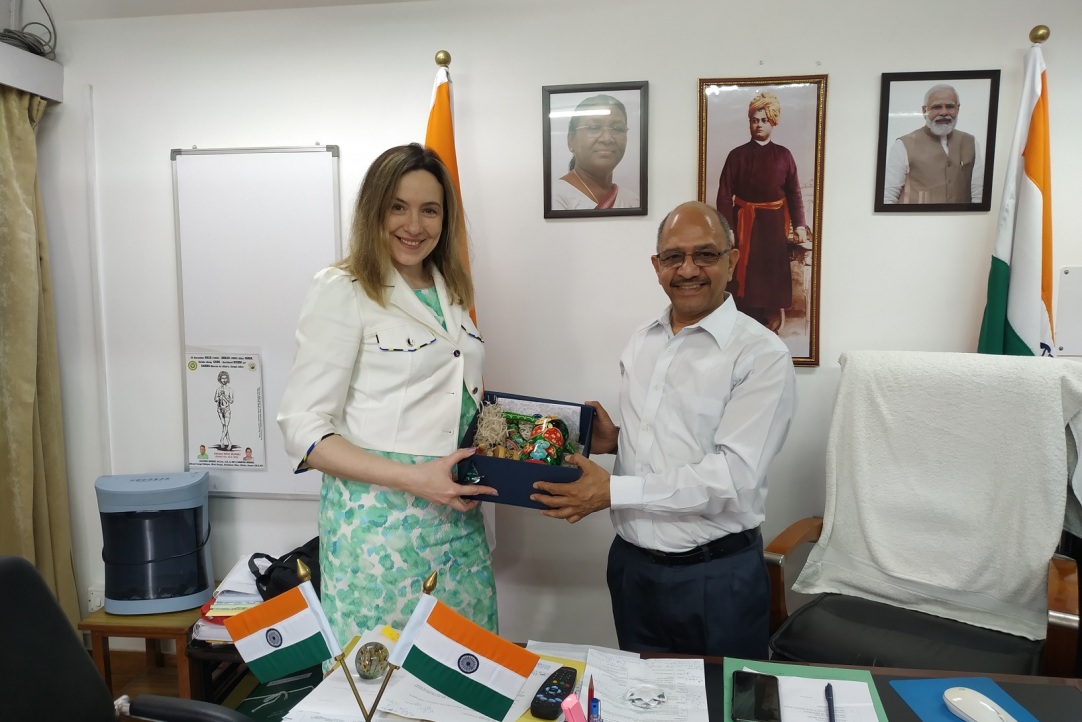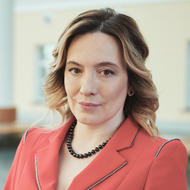BRICS, W20 and Negotiations with Universities: Highlights of the HSE Delegation's Visit to India

An HSE University delegation led by Vice Rector Victoria Panova made a working visit to India in March 2023. HSE representatives took part in the eighth Raisina Dialogue multilateral conference, spoke at a meeting within the framework of the Women 20 (W20), and also held a number of bilateral meetings with leading Indian universities.
The Raisina Dialogue conference has been held annually since 2016 and is currently India's flagship event in the field of geopolitics and geo-economics. Every year, leaders in politics, business, media and civil society gather in New Delhi to discuss world problems and explore opportunities for cooperation on a wide range of issues. The conference is organised by the Observer Research Foundation, a global think tank headquartered in Delhi, and the Ministry of External Affairs of India.
In 2023, Indian Prime Minister Narendra Modi and Russian Minister of Foreign Affairs Sergey Lavrov took part in the Raisina Dialogue. HSE Vice Rector Victoria Panova spoke at a session dedicated to BRICS sustainable development. In her speech, she stressed: ‘We can see the growing popularity and influence of BRICS in the world, and the documents and agreements concluded in this format indicate the constant development of international relations. The idea of multilateralism serves as the fundamental principle of the association's interaction, so the BRICS countries can act as a new “Big Five” (permanent members of the UN Security Council—ed.).’
In addition, HSE representatives participated in the opening meeting of the Women 20 (one of the outreach formats, or dialogue partnerships, of the G20), which took place in Aurangabad. The themes of women's empowerment in the field of education and the development of skills among women entrepreneurs were discussed at the meeting. This topic is one of the priorities for India as Chairman of the W20 in 2023.
Ksenia Shevtsova, Head of the HSE International Partnerships Office and Russia's delegate to the Women 20, spoke about the results of work to increase the accessibility of education for women in G20 countries and shared Russia's best practices in expanding women's participation in economic, political and public life. Ksenia Shevtsova also noted the importance of including women's entrepreneurial projects in state support programmes to eliminate discriminatory norms and practices that create barriers for women in education.

Victoria Panova
Russian W20 Sherpa Victoria Panova noted: ‘In 2022, members of the Eurasian Women's Forum initiated a number of projects aimed at supporting women's entrepreneurial initiatives. Their goal is to create a mechanism for financial, social and expert support for women entrepreneurs who want to develop their potential in these industries. Since last year, coordination between the EWF and the W20 has allowed us to compare notes on the most important global issues.’
In addition to participating in expert events, the HSE delegation held fruitful talks with leading universities in India, including Jawaharlal Nehru University, Delhi University, O.P. Jindal Global University (JGU), as well as the United Service Institution of India (USI).
The parties discussed the prospects of cooperation, defined common points of interest, and outlined further steps to develop international relations. As a result of the negotiations, the parties agreed to increase academic mobility and the exchange of teaching and research experience. Indian universities have expressed interest in HSE BRICS projects, as well as in participating in the Yasin (April) Conference and International Partners’ Week, which will be held in June 2023.
Summing up the results of her visit to India, Victoria Panova stressed the importance of developing Russian-Indian relations, particularly in the humanitarian track. ‘The results of the scientific and educational dialogue achieved between Russia and India will allow us to multiply the indicators of our cooperation,’ she added. ‘At the moment, ten Indian citizens are conducting research at HSE University and 63 Indian students are studying in our degree programmes. The number of research projects with the participation of Indian universities is kept at a consistently high level every year. HSE is ready to continue participating in current initiatives in the field of humanitarian cooperation proposed by India as Chairman of the G20 in 2023.’
Ksenia Shevtsova
See also:
‘Cities Are Key Actors of Interaction in the Global Arena’
The HSE Faculty of Urban and Regional Development (FURD) and India’s leading research centre, the Observer Research Foundation (ORF), have agreed to strengthen their partnership comprehensively in the study and analysis of urban development across BRICS countries. In addition, students and experts from Russia and India will take part in joint academic events and research projects.
Eighth International U4U Online Seminar Unites Experts from 14 Countries
The HSE Online Campus hosted a two-day international U4U (Universities for Universities) seminar, which traditionally serves as a platform for exchanging expertise in online learning. This year, the event has reached a global scale, attracting international experts and representatives of universities from around the world. Together, they discussed key challenges and strategies for the development of online education. The online meeting was held in mid-November.
HSE University–St Petersburg Signs Three Cooperation Agreements with Leading Indian Universities
A delegation from HSE University–St Petersburg has signed cooperation agreements with key educational institutions in India during a visit to the country. Among the projects are new programmes for academic exchange and mobility.
HSE University Holds HSE CS × BRICS Ideathon
On November 9, 2025, the HSE CS × BRICS Ideathon—a large-scale intensive event for students aimed at developing international project skills and finding solutions to current challenges facing BRICS countries—took place at HSE University’s Pokrovsky Bulvar campus. The event was organised by the Multilateral Strategic Projects Office with the support of the BRICS Expert Council–Russia , the Faculty of Computer Science (FCS), and the HSE FCS Hackathon Club
‘India Can Be Very Colourful and Festive’
HSE University's Faculty of World Economy and International Affairs hosted a celebration of the Indian holiday Diwali, which symbolises the triumph of light over darkness and good over evil. Guests were immersed in the authentic atmosphere of India, learning about Diwali’s traditions and symbols, participating in national dances, and taking part in mehendi workshops, rangoli art with rice, and paper lanterns making. The event was organised as part of the ‘Holidays of the Peoples of the East’ project.
‘To Help Make the World More Sustainable, Fair, and Humane’
The BRICS International School: New Generation has concluded at HSE University, bringing together more than 100 participants from 38 BRICS and Global South countries. The attendees included early-career researchers, diplomats, entrepreneurs, journalists, and civil society representatives.
HSE University–St Petersburg to Create Joint Continuing Education Programmes with Indian Business School
A delegation from the Institute for Continuing Professional Education at HSE University–St Petersburg discussed new cooperation formats with the Indian Institute of Management Indore (India). The partnership opens up new opportunities for HSE University–St Petersburg to create interdisciplinary programmes with strong practical elements and immersion in the business cultures of the Asian region.
‘Everyone Who Sees HSE University on My CV Says: “You Must Be So Smart!”’
On October 9–10, the first-ever HSE International Alumni Reunion brought together graduates from various cohorts and programmes—now working in Russia and abroad—along with representatives of HSE University and its industry partners. The event included a tour of the campus, a business game, and a cultural festival. The participants exchanged experiences, reflected on their career paths, and discussed labour market challenges.
HSE University–St Petersburg and Indian Institute of Management to Launch Joint Seminar for PhD Students
Galina Shirokova, Director of the Strategic Entrepreneurship Centre at HSE University–St Petersburg and Doctor of Economic Sciences, held a series of seminars for students of the Indian Institute of Management in Indore (IIM—Indore). Plans are also underway to launch a joint educational project.
‘Regulators Must Understand That Absolute Predictability is Unattainable’
On October 10–11, 2025, the BRICS Competition Law and Policy Centre at HSE University (the BRICS Centre) hosted a two-day international seminar, ‘Platform Economy: Competition Law and the Market Power of Digital Platforms,’ in Tashkent, Uzbekistan. The event brought together competition authorities from BRICS+ nations and leading antitrust experts from around the world.


